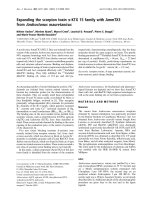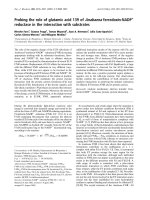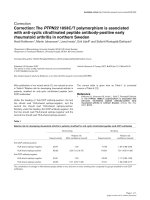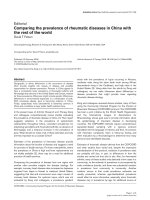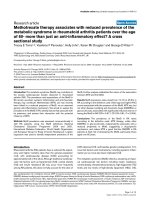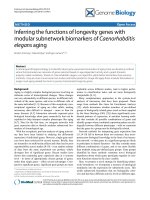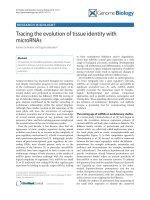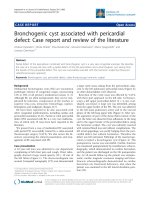Báo cáo y học: "Interfacing the ICU with the general practitioner" pps
Bạn đang xem bản rút gọn của tài liệu. Xem và tải ngay bản đầy đủ của tài liệu tại đây (112.14 KB, 2 trang )
Admission to the intensive care unit (ICU) is only part of
the course that a patient makes during their illness.
Intensive care is not a gatekeeper speciality and patients
therefore generally have their fi rst contact in a hospital
with emergency physicians, surgeons, internists, cardio-
logists, and so forth.
After discharge from the ICU, most patients will return
to the gatekeeper speciality – surgery, internal medicine,
or the like. Following discharge from the hospital,
patients will return to their homes and therefore the
contact with their lifetime physician from their home
situation, the general practitioner (GP), is of utmost
impor tance. is is even more relevant when coordi-
nation of care from diff erent specialists is required. e
GP is also expected to have longstanding knowledge of
the home situation of the patient. Whenever decisions in
terms of end-of-life decisions have to be taken during
ICU admission, the intensivist should be well informed.
Not only is medical professional judgement important,
but also the will and wishes of the patient. To gather all
this information, the intensivist should contact doctors
who have been involved in the treatment of the patient so
far, including the GP, as well as the patient and relatives if
possible. It should therefore be stressed as crucial that
treating intensivists have (regular) contact with GPs.
Etesse and colleagues report in the present issue of
Critical Care about the relationship between GPs and
intensivists in a part of southeastern France [1]. e
authors mailed an anonymous questionnaire to over
7,000 GPs in their region. e response rate was very low
(20%) and this will infl uence the results and conclusion.
However, the results were devastating. Only one-half of
the GPs rated their contact with the intensivist (on a scale
from 1 to 100) at >57, and only 25% rated as >77. e
conclusion that GPs are not very satisfi ed by commu-
nication with intensivists is therefore an under statement.
To which extent the general dissatisfaction of GPs
infl uences the results is not addressed in this French
study. Data from e Netherlands suggest that overall
professional satis faction is worrisome, especially in the
older GPs, and that 34% of all GPs want to stop working
as a GP before the age of 60 [2]. It is of note that this
general dissatisfaction is in line with the specifi c fi nding
of the authors.
e authors did not address whether the ICUs involved
were using any organizational structure within the
depart ment for communication with the GPs. e same
holds true for structural contact with all involved
gatekeeper specia lists. It should be understood that in
cases of end-of-life decisions where the GP has previous
good contact with the family and patient, and therefore
the best knowledge of the premorbid situation, the GP
should be contacted and consulted [3].
Some major changes in the position of the GP, however,
have occurred over the past decades. e solo-working
GP, working 7/7 days, has disappeared since most GPs
nowadays work in a team. A signifi cant proportion of
GPs work part-time, so the old perception of the GP who
knows all his patients from birth to death is outdated. In
addition, GPs are not always easily reached in a timely
fashion, which seriously hampers the communication
process. Although we are not aware of any data, it is not
unreasonable to assume that a signifi cant proportion of
patients in the ICU do not know their GP very well. In
such circumstances it is unlikely that the GP can add to
the information required to make important decisions in
the ICU. e information from the intensive care
Abstract
For many reasons it is crucial that treating intensivists
have (regular) contact with general practitioners
(GPs). Information about the premorbid condition
of the patient, their will and wishes, is of importance
to be able to set appropriate treatment goals. The
GP is the doctor who is responsible for the patient
once discharged from the hospital. Additionally, the
GP can play an important early role in the support of
relatives, provided the GP is timely informed. This kind
of communication should be organized in a structured
way within the intensive care unit department.
© 2010 BioMed Central Ltd
Interfacing the ICU with the general practitioner
Armand RJ Girbes* and Albertus Beishuizen
See related research by Etesse et al., />COMMENTARY
*Correspondence:
Department of Intensive Care, VU University Medical Center Amsterdam, PO Box
7057, 1007 MB Amsterdam, The Netherlands
Girbes and Beishuizen Critical Care 2010, 14:172
/>© 2010 BioMed Central Ltd
department regarding admission to the ICU should
undeniably be given in all cases, and should be timely.
e authors correctly point out the consequences of
ICU admission of the patient for their family and loved
ones. Symptoms of anxiety and depression are very
common in the relatives of critically ill patients.
Psychiatric illness (depres sion, anxiety disorders or
complicated grief disorders) can occur in as much as 30%
of relatives who were confronted with death in an ICU
[4]. GPs can play an important role in this respect,
provided that they are well and timely informed. Etesse
and colleagues must be congratulated on their eff ort,
especially since they distillate tangible advice from their
data that can be easily implemented in a communication
structure of intensive care – including systematic
telephone calls to the GP on admission of the patient to
the ICU, good communication with the family, and
instant information for the GP at the moment of
discharge from the ICU. In our view, the end-of-life
decisions are to be made primarily by the intensivist and
the team involved, using all available and relevant
information [3].
Abbreviations
GP, general practitioner; ICU, intensive care unit.
Competing interests
The authors declare that they have no competing interests.
Published: 30 June 2010
References
1. Etesse B, Jaber S, Mura T, Leone M, Constantin JM, Michelet P, Zoric L,
Capdevila X, Malavielle F, Allaouchiche B, Fabbro Peray P, Lefrant JY: How the
relationships between general practitioners and intensivists can be
improved: the general practitioners’ point of view. Crit Care 2010, 11:R112.
2. Van Ham I: Job satisfaction of the Dutch GP. PhD Thesis, Department of GP
Medicine, State University of Groningen; 2006. [ />faculties/medicine/2006/i.van.ham/]
3. Girbes ARJ: Dying at the end of your life. Intensive Care Med 2004,
30:2143-2144.
4. Beishuizen A, Girbes ARJ: Interfacing the ICU with the next of kin. In
Organisation and Management of Intensive Care. Edited by Flaatten H, Moreno
R, Putensen C, Rhodes A. Berlin: MMW; 2010.
doi:10.1186/cc9066
Cite this article as: Girbes ARJ, Beishuizen A: Interfacing the ICU with the
general practitioner. Critical Care 2010, 14:172.
Girbes and Beishuizen Critical Care 2010, 14:172
/>Page 2 of 2
